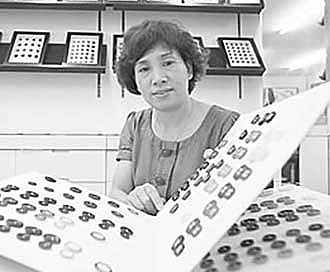by Wu Huanshu
On December 11, 1980, Zhang Huamei, a 19-year-old girl from Wenzhou City in south China's Zhejiang Province, received China's first individual commercial business license – number GSZZ 10101 from the Wenzhou Office of Industry and Commerce, and thereby became modern China's first self-employed entrepreneur. She is now an agent for the Weixing Button Company and a corporate representative for Huamei Clothing.
 |
|
China's first self-employed entrepreneur?Zhang Huamei. |
China Business Times recently had an interview with Zhang Huamei:
China Business Time (CBT hereafter): How does it feel to be China's first self-employed entrepreneur?
Zhang Huamei (Z hereafter): In a sense you could say that Wenzhou started the private economy in China. As for me, I didn't contribute anything special, except that I became a symbol of private business. But being self-employed back then was an achievement, and many people in Wenzhou shared in that achievement.
In 1980, the former revolutionary committee of Wenzhou city issued 1,844 individual business licenses. It was sheer luck that I got the first one; like winning the lottery.
CBT: What was it like applying for the license?
Z: I still remember an official from the Dongcheng district office of industry and commerce said I should get a permit for my business to make it legal. I was a bit reluctant at the time because I thought the permit might be used later to brand me as a capitalist roader.
I couldn't make my mind up, but my father told me not to question the country's reform and opening-up policy. So I went down to the office, filled out a form and gave them a photograph. A short time later they sent me a license and an explanation of the new policy legalizing small businesses. Then I went off to buy supplies and my business took off.
CBT: You opened your store in November of 1979. What were your motives at the time?
Z: Mainly financial, but my father also encouraged me. At the beginning, my store was just a small table in front of my house, and all I sold were cheap daily necessities such as buttons and watch straps. Later, I began to make and sell some small items of my own. As time passed others copied my example.
Back then people who did private business were looked down on. Some of my former classmates wouldn't even say hello to me. But although I felt bad at first, the money made me feel better and I told myself that doing business was no different from being a worker.
CBT: What might have prevented you from applying for a license?
Z: Business had a very bad image at the time. Before the new policy was introduced, all private business was illegal. You could be fined and all your goods confiscated. So to be a businessman was difficult.
CBT: Are you happy with business career?
Z: It's not been too bad. Compared to many others in Wenzhou, my business is very small. But I have a car and a house and I'm happy. I am nearly 50 years old, so it's time for me to relax and enjoy life.
CBT: What's your general view of small business and business people?
CBT: They are the seeds of the private economy. The "Wenzhou model" was created by thousands of small businessmen. Some of that first batch of 1,844 business people have gone on to become great entrepreneurs. Without support from the government, the private economy wouldn't have developed. Reform and opening-up has really improved the lives of the Chinese people. My son is also a businessman. He is much luckier than me, because the social status of businessmen is much higher now than in my generation.
(China.org.cn October 8, 2008)